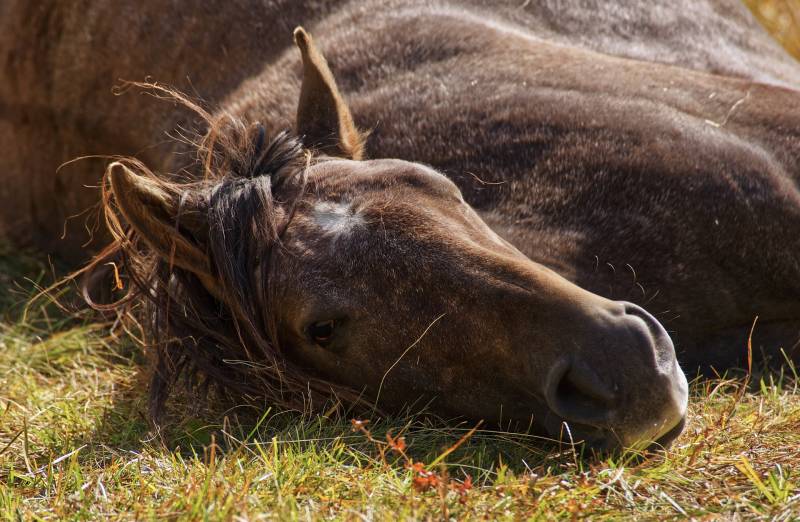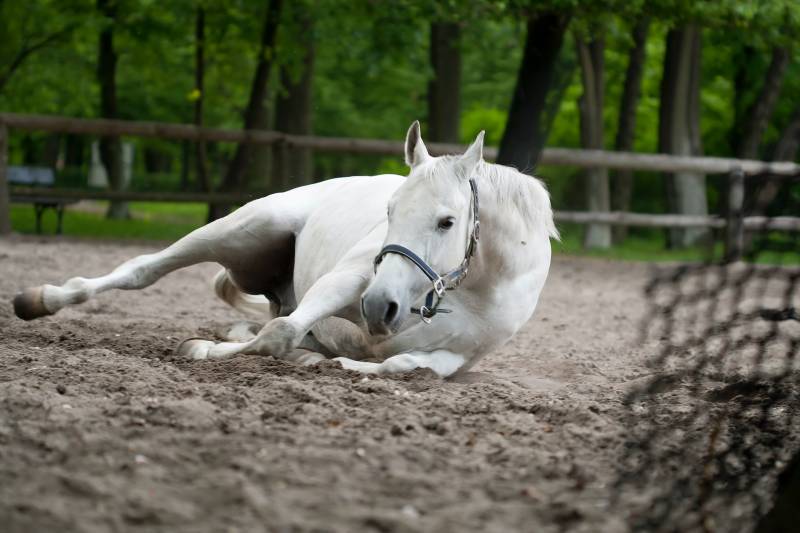Quick Navigation
If you’re a horse breeder or owner, you know it’s crucial to understand their behavior for better control and management.
Some of the behaviors that mares in heat show are hyperactivity, restlessness, and frequent urination.
A unique behavior that horses exhibit after copulation is falling.
If your horse falls after mating, you should not panic at all.

However, it’s crucial to find out if your horse has any other issues aside from the typical fall after copulation.
Here are some of the reasons that make horses fall after mating:
First Time Mating
Many horses fall after mating for the first time.
This is something normal in horses as they may be overwhelmed by excessively aggressive stallions since.
During courting and mating, stallions can be aggressive and hyperactive, and horses are socially sensitive creatures.
Therefore, after mating, the horse falls to regain its energy and allow the heart pumping rate to return to normal.
Other horses will fall every time they mate.
Hormonal Imbalance
Another reason that causes mares to fall after mating is hormonal imbalance.
Like humans, hormones also regulate several processes in the horse’s body.
Thus, if there is an imbalance in hormones, it may affect the horse’s behavior.
And one of the things that hormonal imbalance may cause is the falling of the horse after mating.
One of the things that cause hormonal imbalance in horses is the estrous cycle.
The estrous cycle is the period when the mare is ovulating.
Also, it’s the time when the mare can conceive when she mates.
Hormones in a mare may also cause her to lay down after mating in order to have the best chance of conceiving.
If the estrous cycle is uncontrollable, the mare might fall after mating.
See a veterinarian if your horse doesn’t fall after mating.
But if it does, the vet will as assist you as needed.
Stress
Short-term stress is good for the horse as it helps to keep them safe.
But if the stress prolongs, it can significantly impact the horse’s health and overall well-being.
Chronic stress occurs when a horse’s stress hormone levels increase due to an exceedingly irritating situation.
Excess stress can cause changes in the horse’s behavior, leading to health challenges.
Horses may undergo natural stress during the reproductive stage, such as when mating.
When this happens, the horse may react by falling after mating.
If not managed well, the natural stress can turn into chronic stress that may affect your horse even after conceiving.
The stress experienced by horses during the reproductive stage is usually because of the estrus.
When a mare is feeling the heat, a follicle develops on one of the ovaries and causes her to have an urge for frequent urination.
This bodily change can lead to discomfort and long-term stress.
Hence, it’s crucial to observe your horse closely when it shows an unusual change in behavior such as falling after mating.
A horse can also experience stress because of housing conditions, changes in exercise, or even a poor diet.
Make sure your horse is comfortable to avoid increasing its stress level.
Syncope
Syncope is a condition where a horse faints because of insufficient blood flow to the brain.
It also shows that there is low arterial blood pressure.
Most horses that suffer from this condition have heart problems.
Syncope is usually short and horses can recover spontaneously.
This condition has three categories which are cardiogenic, neural, and miscellaneous
If a horse has syncope or heart issues, it may faint after mating.
Aside from fainting, the horse may also experience cardiac arrest, which can be fatal.
That’s why it’s essential to have your horse regularly checked by the veterinarian.

However, it’s normal for horses to have heart attacks while mating.
Syncope is not life-threatening, and your horse will regain consciousness after a short period.
If your horse has never suffered from syncope, you have nothing to worry about.
This is because your hose may have fallen due to an abrupt drop in blood pressure rather than syncope.
Narcolepsy
Your horse may also fall after mating because of narcolepsy.
Narcolepsy is a unique and incurable sleep disorder of the central nervous system.
It is usually marked by sleep attacks at an unexpected times.
This disorder is also typically accompanied by unmanageable loss of muscle tone.
This disorder usually manifests itself when the horse is groomed excessively, after mating, being fed, or when stroked.
It can also occur during long periods of inactivity during the day.
However, it’s also vital to know that narcolepsy is more susceptible in some horse breeds than others.
Some of the horse breeds that are usually affected by narcolepsy are miniatures, shetlands, and Suffolk punches.
If you notice these signs before your horse falls, just know that it’s suffering from narcolepsy.
They include rapid flicking from the eye from side to side, progressive lowering of the head, and partially closed eyes.
Horses may also frequently rest their heads or hindquarters on fences or other objects.
They might also sway and stumble frequently.
When Do Horses Mate?
The good thing about learning your horses’ mating behavior is that their mating season doesn’t last long.
So, you will not have to keep a keen eye on your horse all year round.
Horses typically mate in spring and summer.
The light during early spring has a factor in mares coming into heat.
Besides, horses love mating during the day and not at night.
Stallions can usually erect up to 18 times a day and mate 2 to 3 times.
The mares usually have an estrous cycle of around 21 days, followed by 3 to 7 days of heat.
The horses do mate in spring or summer so that the foals will be born in the month when the survival rate is high.
Summary
Understanding your horse’s behavior will give you a better chance of managing them.
When your horse falls after mating, it can mean that the horse has an underlying issue, or it’s just a normal response that horses show after copulation.
Stress, excitement, and hormones are other things that can cause your horse to fall after mating.
If your horse has an underlying problem, make sure to visit a veterinarian so that they can check up on your animal.
Therefore, you should not panic when your horse falls after mating, as it’s a natural thing.

Purrfect n’ Pawesome is the brainchild of Amanda, who has been into researching and writing about pets to help other pet parents in nurturing their adorable pets. Currently, she runs Purrfect n’ Pawesome along with her team of experienced and dedicated pet experts. Along with being an awesome writer and entrepreneur, Amanda is a cat mom to two innocently spoiled cats, Balanca and Scruffy.
She has been writing about pet care and nurturing and wants to share her readers’ experiences, learnings, and knowledge.
Over the years, she had the opportunity to work with various pet owners having multiple breeds, and that exposure gave her experience and the lessons of a lifetime.
Her family, her entire universe revolves around her two cats, who give her endless support and inspiration to move ahead with her objectives in life. Amanda is a live example of a balanced approach to all parenthood questions we all face in life.
